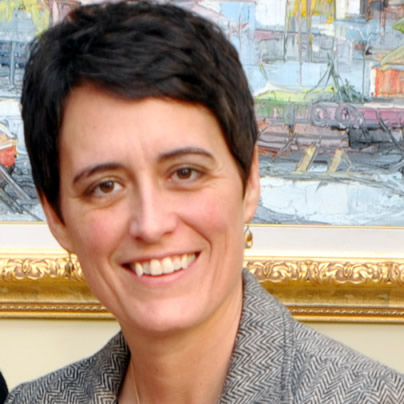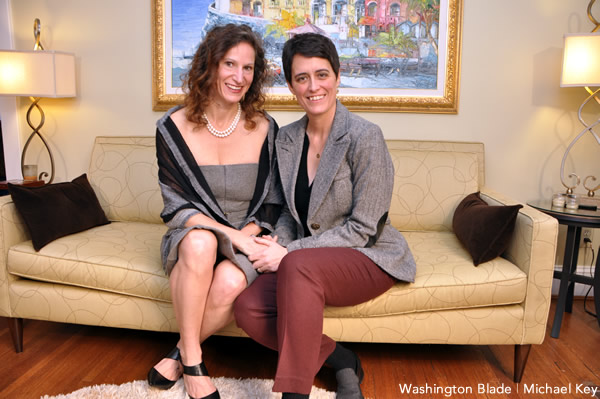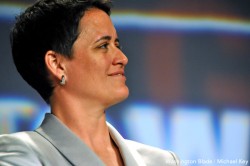Local
EXCLUSIVE: Mizeur eyeing run for Md. governor
Lesbian lawmaker says she would make ‘a good chief executive’


Heather (right) and Deborah Mizeur at their Takoma Park home. Heather is contemplating a run for governor. (Washington Blade photo by Michael Key)
Heather Mizeur, a lesbian member of the Maryland House of Delegates, said she’s seriously considering a run for governor in an exclusive interview with the Washington Blade this week.
“I’m taking a very serious look at it,” Mizeur said. “I can’t say for sure what 2014 is going to bring but … I know that I would make a good chief executive. I have good ideas for keeping Maryland moving forward.”
A run by Mizeur would mark another key milestone in the LGBT rights movement. If successful, she would be the first to win election as an openly gay candidate for governor in the country. Former New Jersey Gov. Jim McGreevey announced he is gay and then promptly resigned from office in 2004 after disclosing he’d had an extramarital affair with a male adviser.
Mizeur said she only recently began thinking of running and was inspired by the results of last week’s elections.
“Right now we’re taking stock of what happened in the last election,” she said. “It was incredible to see a big win with Tammy Baldwin being elected the first openly gay senator and Kyrsten Sinema making history in Congress. It really has inspired us to keep pushing forward. So, yes, I’m seriously considering running for governor because we need more diverse voices at that level of government.”
Mizeur, who turns 40 in December, is a Democrat who represents the 20th District, which includes Silver Spring, Takoma Park, White Oak and other areas in progressive Montgomery County. She was first elected to the legislature in 2006.
Marylanders will elect their next governor in November 2014. Democratic Gov. Martin O’Malley is serving his second and final term. Several high-profile figures are expected to run for the office, including Lt. Gov. Anthony Brown, Attorney General Douglas Gansler, Comptroller Peter Franchot and Howard County Executive Ken Ulman.
Mizeur’s potential competitors have a significant advantage when it comes to cash on hand. Gansler has more than $4 million in cash on hand as of an April report; Ulman had $1.3 million as of June; and Brown had $810,841 according to a January report. Records show Mizeur had about $216,000 in cash on hand, according to a January report.
“That’s one of the biggest things I’m weighing in deciding to get in the race,” she said regarding fundraising. “I only started thinking about this race recently and the other candidates planning to run have been planning to do this for a really long time so they have a head start in the money chase. I also spent 2012 raising money and working on winning Question 6, rather than raising money for myself.”
She added that she won’t get in the race unless she can be competitive financially. Mizeur would certainly tap a national network of donors from her seven years as a Democratic National Committee member and experience working on the Hill and on political campaigns. She worked for former presidential candidate Sen. John Kerry’s campaign and famously endorsed Barack Obama for president in 2008 after attracting national attention over whether she’d back him or rival Hillary Rodham Clinton. Additionally, a Mizeur candidacy would likely attract support from the Gay & Lesbian Victory Fund given the opportunity for a barrier-breaking race and from EMILY’s List considering there is only one Democratic female governor currently in office in the country. The Victory Fund endorsed her in 2006 and 2010 but said it is premature to discuss another endorsement at this time.
“At this point, our work to grow the number of out elected officials in America involves a lot of firsts, a lot of milestones,” said Victory Fund President and CEO Chuck Wolfe, when asked about a potential Mizeur run for governor. “One of those would obviously be helping to elect an out candidate as a governor, which has never happened. With more than 100 openly LGBT state legislators now in office, and the most-ever out members of Congress preparing to be sworn in, that day may come sooner than many imagine.”
When asked whether he had any thoughts about Mizeur’s potential gubernatorial campaign, O’Malley told the Blade on Tuesday, “Not really, I’m supporting Lt. Gov. Anthony Brown wholeheartedly for governor of Maryland.”

If she runs and wins, Heather Mizeur would be the first openly gay person to win a governor’s race in the country. (Washington Blade photo by Michael Key)
Mizeur declined to say when she expects to make a final decision on the race, noting that right now she’s dedicated to preparing for the upcoming legislative session in Annapolis. But to be competitive, she would likely need to make a final decision by early spring, just after the session ends.
“We have a robust slate of issues to address next year, including fracking, paid sick days for employees and job creation efforts,” she said.
Given the expected competition from a sitting lieutenant governor backed by the popular O’Malley — not to mention Gansler, who has long been vocal about his support for marriage equality — what makes Mizeur think she can compete?
“I’m out giving speeches and working with people across the state and they’re encouraging me to get in this race,” she said. “They’re telling me we need your passion and message — I’m not the candidate that’s just next in line or seeking a professional promotion; I’m out there expressing what I believe and trying to rally communities around those ideas and common purpose. And that’s where this came from — from the ground up.”
Some have speculated that Mizeur is positioning herself for lieutenant governor, a rumor that she dismissed with a curt, “I’m usually not a plan B person.”
Mizeur said Maryland’s next governor must focus on jobs and the economy. In a high-profile split with O’Malley earlier this year, she came out against ballot Question 7, which ultimately passed and allows for an additional casino to be built and for table games at existing casinos in the state.
“I spent a lot of time speaking against gaming as a failed form of economic development for the state and instead talked about a range of ideas for job creation — rebuilding schools, transportation is at a crisis point in the state … workforce development.” She said that construction of the Purple Line in the D.C. suburbs would create 27,000 jobs while Baltimore’s proposed Red Line would create another 15,000. She also noted that the state’s health care needs should bring another 120,000 related jobs over 10 years to the state. She has long worked on health-related issues and looks forward to playing a role in implementing the federal health care reform law.
Mizeur married her spouse, Deborah Mizeur, in 2005 at a ceremony along the Chesapeake Bay.
“We married in front of family and friends and God; we just didn’t get any rights associated with it,” she said. “Seven years later, here we are.”
The couple traveled to California and were married just before voters there enacted Proposition 8 in 2008, which ended same-sex marriage, though couples already wed remained legally married. She said they won’t have another ceremony now that Maryland has approved marriage equality, because their California marriage is now fully recognized here. The two live in Takoma Park with a dog, Chester, and two cats and own a consulting business, the Mizeur Group, which does federal policy analysis work. They also own an organic herb farm in Chestertown, Md.
She and Deborah spent election night at a Baltimore celebration along with O’Malley and Baltimore Mayor Stephanie Rawlings-Blake.
“Deb and I were all smiles — we hugged and embraced and said this is what a happy legally married couple looks like,” she said, upon hearing that Question 6 passed. “It’s still hard to put into words. You never want to have your civil rights put to a majority vote but it was incredibly fulfilling knowing that Marylanders across the state … stood up to do the right thing.”
The battle over Question 6 was a contentious one with a diverse coalition of in-state and out-of-state groups claiming a piece of the credit for its passage, sometimes leading to heated accusations. One advocate, who spoke on condition of anonymity, accused Freedom to Marry’s Evan Wolfson of telling a “big fat lie” when touting his organization’s contributions to the fight. Josh Levin, campaign manager of Marylanders for Marriage Equality, said that although Mizeur was helpful, she could have done more.
“Del. Mizeur helped raise some money for the campaign, but wasn’t closely involved,” Levin said. “She helped with a few events, but others did far more and her attention was clearly more focused on other priorities, including a potential statewide run.”
Mizeur disputes that characterization, noting her participation in fundraising events, testifying on behalf of the bill and delivering an emotional floor speech prior to the vote. Mizeur said she and the other seven openly gay and lesbian members of the state legislature devoted much of 2012 to the marriage cause.
“Each of us was working hard in our own way,” she said. “My entire public schedule was Question 6-related for months.”
With that fight over, she said the next job for the state’s LGBT advocates is to push for non-discrimination protections based on gender identity and to work on causes important to those who joined the coalition for marriage equality.
“It’s important for our community to be seen as coming together to work on issues that are outside LGBT priorities,” she said. “We only won Question 6 because we had an amazing coalition that crossed party lines, age, race. We can’t just be seen as fighting for this form of equality and turning a blind eye to other causes.” She cited hunger, school achievement gaps, living wage and reforming the criminal justice system as priorities.
Mizeur talks openly about her Catholic faith but said she did not encounter any anti-gay sermons over the marriage issue this year because she goes to parishes run by Jesuits who are more progressive. Despite the Catholic Church’s prominent role in funding anti-gay causes around the country, Mizeur contends it’s important not to abandon the church.
“We have to fight for change from within,” she said. “If all progressive Catholics left, there’d be no reason to live up to the church’s potential.”
Mizeur was raised in a tiny farming community in rural Illinois called Blue Mound, population 1,100. She’s from a fifth generation farming family, but her father was a factory worker and UAW member his entire career. She spent time with him on picket lines, which helped inspire her pursuit of public service.
The experience of walking picket lines “taught me the value of sacrifice and hard work and standing up for the courage of your convictions,” she said. “Catholic teachings on social justice also inspired me.”
Michael K. Lavers contributed to this report.
Maryland
Md. Commission on LGBTQIA+ Affairs released updated student recommendations
LGBTQ students report higher rates of bullying, suicide

The Maryland Commission on LGBTQIA+ Affairs has released updated recommendations on how the state’s schools can support LGBTQ students.
The updated 16-page document outlines eight “actionable recommendations” for Maryland schools, supplemented with data and links to additional resources. The recommendations are:
- Developing and passing a uniform statewide and comprehensive policy aimed at protecting “transgender, nonbinary, and gender expansive students” against discrimination. The recommendation lists minimum requirements for the policy to address: name, pronoun usage, and restroom access.
- Requiring all educators to receive training about the specific needs of LGBTQ students, by trained facilitators. The training’s “core competencies” include instruction on terminology, data, and support for students.
- Implementing LGBTQ-inclusive curricula and preventing book bans. The report highlights a “comprehensive sexual education curriculum” as specifically important in the overall education curriculum. It also states the curriculum will “provide all students with life-saving information about how to protect themselves and others in sexual and romantic situations.”
- Establishing Gender Sexuality Alliances “at all schools and in all grade levels.” This recommendation includes measures on how to adequately establish effective GSAs, such as campaign advertising, and official state resources that outline how to establish and maintain a GSA.
- Providing resources to students’ family members and supporters. This recommendation proposes partnering with local education agencies to provide “culturally responsive, LGBTQIA+ affirming family engagement initiatives.”
- Collecting statewide data on LGBTQ youth. The data on Maryland’s LGBTQ youth population is sparse and non-exhaustive, and this recommendation seeks to collect information to inform policy and programming across the state for LGBTQ youth.
- Hiring a full-time team at the Maryland Department of Education that focuses on LGBTQ student achievement. These employees would have specific duties that include “advising on local and state, and federal policy” as well as developing the LGBTQ curriculum, and organizing the data and family resources.
- Promoting and ensuring awareness of the 2024 guidelines to support LGBTQ students.
The commission has 21 members, with elections every year, and open volunteer positions. It was created in 2021 and amended in 2023 to add more members.
The Governor’s Office of Communication says the commission’s goal is “to serve LGBTQIA+ Marylanders by galvanizing community voices, researching and addressing challenges, and advocating for policies to advance equity and inclusion.”
The commission is tasked with coming up with yearly recommendations. This year’s aim “to ensure that every child can learn in a safe, inclusive, and supportive environment.”
The Human Rights Campaign’s most recent report on LGBTQ youth revealed that 46.1 percent of LGBTQ youth felt unsafe in some school settings. Those numbers are higher for transgender students, with 54.9 percent of them saying they feel unsafe in school.
Maryland’s High School Youth Risk Behavior Survey reveals a disparity in mental health issues and concerns among students who identify as LGBTQ, compared to those who are heterosexual. LGBTQ students report higher rates of bullying, feelings of hopelessness, and suicidal thoughts. Nearly 36 percent of LGBTQ students report they have a suicide plan, and 26.7 percent of respondents say they have attempted to die by suicide.
The commission’s recommendations seek to combat the mental health crisis among the state’s LGBTQ students. They are also a call for local and state governments to work towards implementing them.
Virginia
Va. lawmakers consider partial restoration of Ryan White funds
State Department of Health in 2025 cut $20 million from Part B program

The Virginia General Assembly is considering the partial restoration of HIV funding that the state’s Department of Health cut last year.
The Department of Health in 2025 cut $20 million — or 67 percent of total funding — from the Ryan White Part B program.
The funding cuts started with the Trump-Vance administration passing budget cuts to federal HIV screening and protection programs. Rebate issues between the Virginia Department of Health and the company that provides HIV medications began.
Advocates say the funding cuts have disproportionately impacted lower-income people.
The Ryan White HIV/AIDS Program, a federal program started in 1990, provides medical services, public education, and essential services. Part B offers 21 services, seven of which remained funded after the budget cuts.
Equality Virginia notes “in 2025, a 67 percent reduction severely destabilized HIV services across the commonwealth.”
Virginia lawmakers have approved two bills — House Bill 30 and Senate Bill 30 — that would partially restore the funding. The Ryan White cuts remain a concern among community members.
Both chambers of the General Assembly must review their proposed changes before lawmakers can adopt the bills.
“While these amendments aren’t a full restoration of what community-based organizations lost, this marks a critical step toward stabilizing care for thousands of Virginians living with HIV,” said Equality Virginia Executive Director Narissa Rahaman. “Equality Virginia plans to continue their contact with lawmakers and delegates through the conference and up until the passing of the budget.”
“We appreciate lawmakers from both sides of the aisle who recognized the urgency of this moment and will work to ensure funding remains in the final version signed by the governor,” added Rahaman.
District of Columbia
D.C. Black Pride theme, performers announced at ‘Speakeasy’
Durand Bernarr to headline 2026 programming

The Center for Black Equity held its 2026 DC Black Pride Theme Reveal event at Union Stage on Monday. The evening, a “Speakeasy Happy Hour,” was hosted by Anthony Oakes and featured performances by Lolita Leopard and Keith Angelo. The Center for Black Equity organizes DC Black Pride.
Kenya Hutton, Center for Black Equity president and CEO, spoke following the performances by Leopard and Angelo. Hutton announced this year’s theme for DC Black Pride: “New Black Renaissance.”
Performers for 2026 DC Black Pride were announced to be Bang Garcon, Be Steadwell, Jay Columbus, Bennu Byrd, Rue Pratt and Akeem Woods.
Singer-songwriter Durand Bernarr was announced as the headliner for the 2026 festivities. Bernerr gave brief remarks through a video played on the screen at the stage.
DC Black Pride is scheduled for May 22-25. For more information on DC Black Pride, visit dcblackpride.org.

















